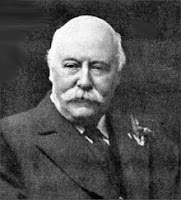 |
| Hubert Parry 1848 - 1914 |
I absolutely love this work because it's the only piece of music that actually makes me feel genuinely patriotic! The opening thirds on the organ and the grandeur of the pedal accompaniment (actually played by trumpets in some cases) sets the stage for the full power of the choir. Here is another example of words and music together at their best. An expression of the nation's love for this piece is the fact it was sung while the Duchess of Cambridge walked through Westminster Abbey at her wedding.
I was glad when they said unto me
We will go into the house of the lord
Our feet shall stand in thy gates, O Jerusalem
Jerusalem is builded as a city
That is at unity in itself.
O pray for the peace of Jerusalem,
They shall prosper that love thee
Peace be within thy walls,
And plenteousness within thy palaces.
Left: The Duchess of Cambridge walks through Westminster Abbey to Parry's 'I Was Glad'
 |
| Westminster Abbey choristers |
Coincidentally, my choir sang the same piece in Westminster Abbey a few weeks before the wedding to celebrate the trust in which our school is a part of. We were also singing with the Westminster choir and, despite the fact the boys singing my part were barely 12 years old, they had incredibly powerful and musical voices that rung through the entire building.
Parry's diatonic style is particularly prominent here. His music has so many elements of grandeur that I always feel as if I should be on my feet to listen to it. Not only did Kate Middleton get to be married in one of the most iconic buildings in Britain, but she appropriately walked to the sound of one of the greatest English composers who ever lived. This piece is outstanding in every way, and even if some disagree, it makes a change from bloody Pachelbel's Canon!

I know Hubert Parry has traditional English qualities but the words diatonic and grandeur did strike me as being representative also of Wagner’s “Meistersinger”.
ReplyDeletehttp://www.youtube.com/watch?v=97eRAFwkYgQ